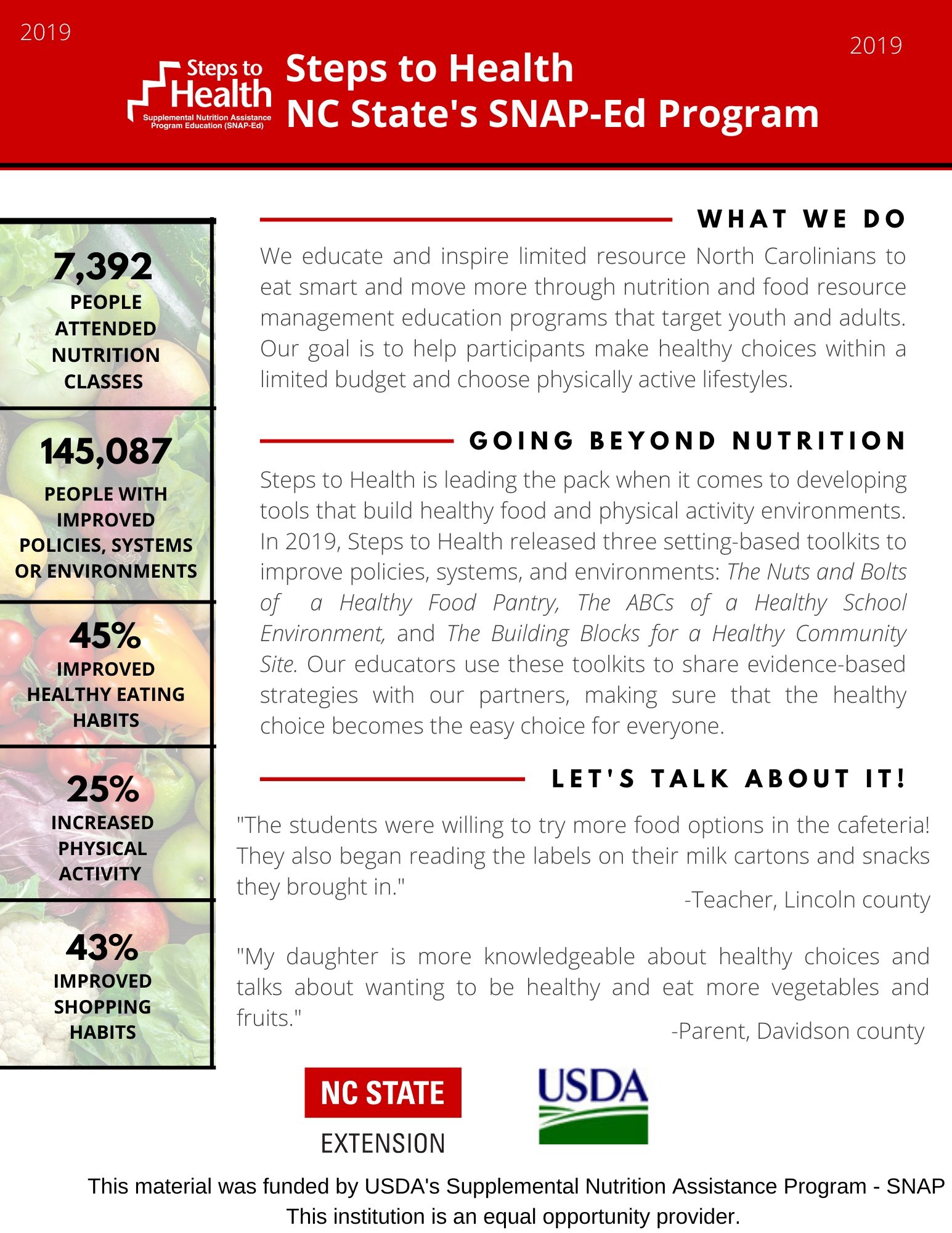Healthy Eating Improves With Steps to Health
go.ncsu.edu/readext?679228
en Español / em Português
El inglés es el idioma de control de esta página. En la medida en que haya algún conflicto entre la traducción al inglés y la traducción, el inglés prevalece.
Al hacer clic en el enlace de traducción se activa un servicio de traducción gratuito para convertir la página al español. Al igual que con cualquier traducción por Internet, la conversión no es sensible al contexto y puede que no traduzca el texto en su significado original. NC State Extension no garantiza la exactitud del texto traducido. Por favor, tenga en cuenta que algunas aplicaciones y/o servicios pueden no funcionar como se espera cuando se traducen.
Português
Inglês é o idioma de controle desta página. Na medida que haja algum conflito entre o texto original em Inglês e a tradução, o Inglês prevalece.
Ao clicar no link de tradução, um serviço gratuito de tradução será ativado para converter a página para o Português. Como em qualquer tradução pela internet, a conversão não é sensivel ao contexto e pode não ocorrer a tradução para o significado orginal. O serviço de Extensão da Carolina do Norte (NC State Extension) não garante a exatidão do texto traduzido. Por favor, observe que algumas funções ou serviços podem não funcionar como esperado após a tradução.
English
English is the controlling language of this page. To the extent there is any conflict between the English text and the translation, English controls.
Clicking on the translation link activates a free translation service to convert the page to Spanish. As with any Internet translation, the conversion is not context-sensitive and may not translate the text to its original meaning. NC State Extension does not guarantee the accuracy of the translated text. Please note that some applications and/or services may not function as expected when translated.
Collapse ▲The Supplemental Nutrition Assistance Program-Education (SNAP-Ed) serves limited resource individuals and families nation-wide. SNAP-Ed is funded by the United States Department of Agriculture Food and Nutrition Service and, in North Carolina, works in collaboration with the NC Department of Health and Human Services, Division of Social Services. The goal of SNAP- Ed is to assist those eligible for food assistance to eat smart and move more. SNAP-Ed works to help participants make healthy choices within a limited budget and choose physically active lifestyles consistent with the current Dietary Guidelines for Americans and MyPlate.
North Carolina State University’s SNAP-Ed project is called Steps to Health. Fiscal year 2019 (FY19) was the eleventh year of implementation for Steps to Health. Direct education programs, all with the ultimate goal of promoting positive behavior change related to nutrition and physical activity, were delivered by North Carolina Cooperative Extension Family & Consumer Science agents, 4-H Youth Development agents, and Steps to Heath Nutrition Educators. For FY19, Steps to Health reached 7,392 participants (6,572 children and 820 adults) and made 52,940 educational contacts within 59 counties across North Carolina. Additionally, Steps to Health promoted policy, systems, and environmental (PSE) change initiatives across sites and communities receiving direct education by providing site-specific resources and engaging site leadership. Steps to Health worked with 218 sites to implement at least one PSE change, with an estimated reach of 145,087 individuals.
Steps to Health expanded its policy, systems, and environmental change work by developing practical, evidence-based toolkits that our field educators can use in a variety of settings, including schools, adult community sites, food pantries, and farmers’ markets. These toolkits were used as a complement to direct education and have been met with positive feedback from those who have piloted and used the toolkits. We will be able to evaluate the larger scale impact of the toolkits in FY20. This effort would not have been possible without statewide and regional relationships, in particular collaboration with MANNA FoodBank.
The campus-based Steps to Health team provides annual programmatic training for those implementing Steps to Health at the county level. In FY19, Steps to Health provided technical assistance for Extension Agents on a regular basis, and new Extension Agents were provided with an overview of programs at New Professionals Orientation, training in-person, and through online modules. The Steps to Health PSE toolkit, The Nuts and Bolts of a Healthy Food Pantry, was a major focus during a presentation at the North Carolina Extension Association of Family and Consumer Sciences (NCEAFCS) conference in August 2019. Program partners took the opportunity to share their successes in collaborating with Steps to Health in food pantries. Steps to Health also created a display at the conference which showcased program impacts and success stories. Steps to Health collaborated with EFNEP to present Coordination of Nutrition Programs to Extension agents and educators at their spring training. Steps to Health staff also shared the success of PSE initiatives with other SNAP-Ed implementing agencies in the Southern Regional at the SERO SNAP-Ed Meeting in December 2018.



